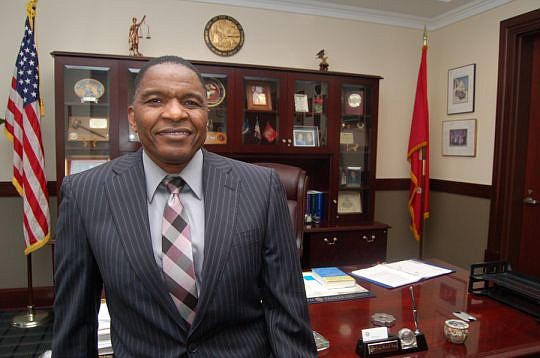
“You are being given an opportunity to participate in the Duval County Veterans Treatment Court program.”
That’s the first sentence in the 24-page handbook offered to former military service members who are being given a second chance to choose treatment rather than incarceration when they enter the criminal justice system due to issues related to substance abuse.
Duval County Judge Mose Floyd has been assigned to take over the program in Duval County. A graduate of the U.S. Naval Academy who served for more than 20 years in the Marine Corps and then more than a decade as an assistant state attorney, Floyd said his new command will be like coming home.
His experience gives him an understanding of what veterans have been through and what it will take to put them back on the right path.
“I think when they learn my background, they will listen. Maybe I can reach them and use their military service to increase the feeling of brotherhood and a sense of teamwork,” Floyd said. “I did it successfully for 22 years in the Marine Corps and that doesn’t go away.”
The program is a court-supervised treatment plan for defendants with criminal charges who are active duty or who have an honorable or general under honorable conditions discharge from the military. They also must have a documented service-related mental health diagnosis such as post-traumatic stress disorder, traumatic brain injury and/or substance abuse.
The program requires managed individual, group or residential treatment, drug and alcohol testing, regular court appearances, attendance at 12-step support group meetings and participation in educational opportunities intended to provide the skills needed to achieve a stable lifestyle.
“I’ve seen them come through the judicial system when I was practicing as a prosecutor for 12 years and now on the bench,” said Floyd.
“I see good people who are dealing with issues that don’t allow them to hold down a good job and support their families. I am ready to help them get back on track because not only does it affect them, it affects the community and their families. They are good people who have served their country and deserve the assistance they need to get back on the right track,” he added.
Entering the program and following it through graduation can allow a participant to avoid prosecution and criminal penalties if convicted. In some cases, a successful participant’s record relating to their arrest may be eligible to be sealed or expunged, but failure to meet the program’s requirements will result in further prosecution
“For those who are willing to take advantage of it, it gives them a leg up to get back to being a productive member of society and hold their head up like they did when they were in the military,” said Floyd.
The program has been available in Clay and Duval counties since 2013. In Duval, 153 veterans have entered the program — 81 have graduated, 57 remain active and only 15 have been discharged before completion.
In Clay County, 51 veterans have enrolled, comprising 30 graduates, 16 still in the program and only five discharged before completing the program.
On April 5, the 4th Judicial Circuit Veterans Treatment Court became one of only four national mentor courts recognized by the National Association of Drug Court professionals, Justice for Vets and the U.S. Justice Department.
For the next three years, prosecutors, public defenders, judges, court administrators and social service providers from jurisdictions nationwide will come to Jacksonville to study the circuit’s model program.
“We’ve taken the bull by the horns and we’re showing an example to the nation,” said Floyd.
He won’t be polishing his officer’s insignia and pinning it on his robe, but Floyd said he’ll bring the military sense of honor and discipline to the proceedings in Veterans Court.
“My goal is to improve on the success rate, build on the success stories we already have and bring in more people who are suffering from service-related substance abuse issues and get them better situated to get back out in life and be productive.
“I’m looking forward to helping them mend their lives,” he said. “We leave no one behind. In the Marine Corps, that’s what we live by.”
(904) 356-2466